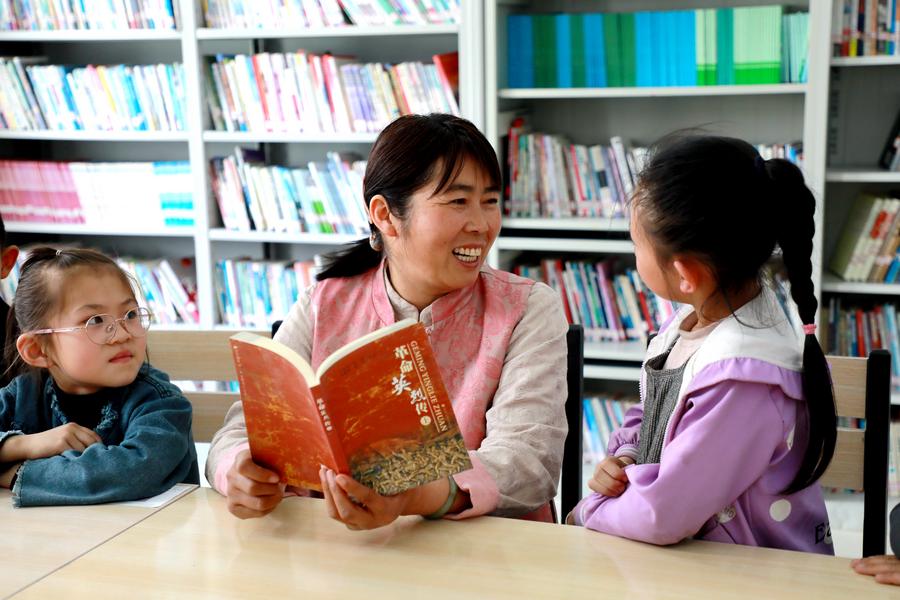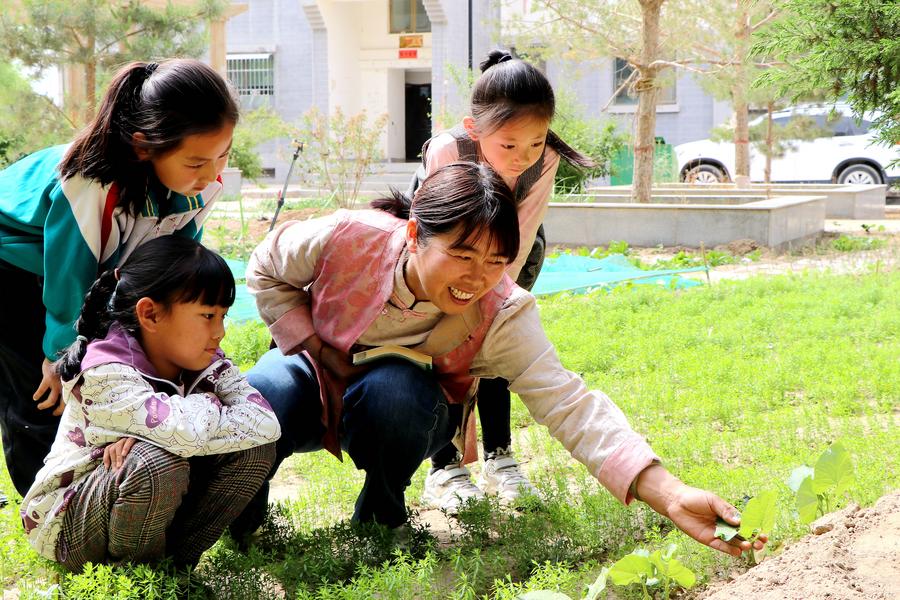Pei Aimin shares her reading experience with local primary school students, who are also left-behind children, in Minqin County, north China's Gansu Province, May 10, 2024. (Xinhua)
For a long time, local villagers viewed Pei Aimin as just an ordinary farmer who spent her days toiling in the fields, taking care of her family and chatting with neighbors. In recent times, however, the 50-year-old woman from northwest China's Gansu Province has gained a reputation as a writer, gathering a fine literary harvest from the land.
"I always crouch in the fields, watching the clouds gather and scatter, feeling the breeze stroking the seedlings," she said. "The rhythm of nature brings tranquility, which I like to record with my pen."
Pei lives in Shangxin Village, Minqin County, which is surrounded by the Badain Jaran and Tengger Deserts. In 2022, she published her first book, "Diary of Aunt Vole," consisting of a collection of prose passages in diary format, describing rural life in the modern day.
"I used to think that farmers lived a hard and dull life. But through Pei's writing, I can see a free and unbounded pastoral life," said 26-year-old reader Fu Wei.
In Pei's room there is a work of calligraphy which reads, "Plowing in sunny days and reading when it rains," which is a reflection of Pei's life. After finishing her farm work, she often sits down to write or edit.
"The encouragement I've received has boosted my love of writing, and I want to share the changes taking place in our village," Pei said.
At the mention of changes in the countryside, she happily talks at length about the improvements that have taken place. Ten years ago, she grew corn and wheat on her family's 15 mu of land (about one hectare), earning up to 1,500 yuan (about 211 U.S. dollars) for each mu. Now, thanks in part to crop diversification, her income has increased significantly.
"Guess how much you can earn with 1.2 mu of land? If you set up a greenhouse to grow ginseng fruit, you can earn 100,000 yuan a year," said Pei, beaming.
She believes farming has been made much easier through intelligent agriculture and mechanical operation. "An area of corn measuring 10 mu can be reaped by harvesters in two hours. This same workload used to take us up to six days," she said.
Pei Aimin explains as local primary school students listen in a session to identify different plants in Minqin County, north China's Gansu Province, May 10, 2024. (Xinhua)
Since China eradicated absolute poverty, rural vitalization has been in full swing throughout the country. Young people from various backgrounds, including fresh university graduates and those interested in rural development, have been keen to join the rural vitalization effort.
"Running a farm, or engaging in e-commerce, young people now have diverse career choices in rural areas," Pei said.
Such changes are also recorded in works of Song Yaping, a 54-year-old rural writer living in Lingtai County of Gansu.
According to Song, modern farmers are quite different from traditional ones: "Generally, they are intelligent and insightful. Although they live in villages, they have a broader vision. The world they care about is not limited to rural life."
In his view, the process of urbanization in the countryside means many farmers have purchased new houses or rebuilt old ones, thereby embracing a better quality of life.
"My aim as a writer is to truly describe the rural life that I'm familiar with, and to faithfully record the era in which I'm living."
One of his short stories has been adapted into a movie script, and will soon be hitting the silver screen.
"I hope my works will reach more and more readers, and a wider audience in the movies and television," he said. ■

